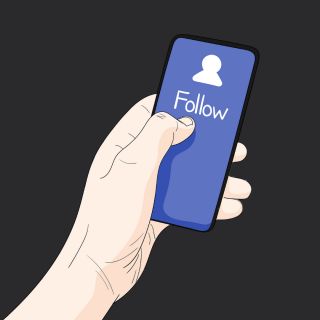Social Networking
Is Social Media Mental Health Keeping People Sick?
It can destigmatize disease and build community but may halt healing.
Posted December 15, 2022 Reviewed by Vanessa Lancaster
Key points
- Companies might exploit a person's mental health journey for their gain.
- Tying mental health struggles to an online identity may limit new mental wellness sharing or experiences.
- Currently, mental illness is seen as a marketable commodity, so be careful when disclosing online.

When a person shares their mental struggles on social media–and I notice their followers grow in exponential jumps–my belly tightens. And before anyone reading this gets offended, yes, I agree: There are many positives to publicly sharing first-person mental health stories. For instance, let's revisit the pandemic.
During Covid, issues like anxiety, depression, and eating disorders skyrocketed. Content creators helped to spread mental health information and support at rates unsurpassed. Historically unavailable information became accessible to anyone with an internet connection. Firsthand stories connected people, helping quarantined and isolated individuals feel less alone and likely more hopeful about their own struggles. And those benefits are not limited to a global pandemic.
However, repeatedly, I see that building a following by sharing personal stories of mental health journeys can box people in–keep them stuck. I’m a lurker online who has been watching this phenomenon for a while. And an observable pattern follows.
Imagine a mental health influencer–let’s call them "GramTok." GramTok shares their mental health journey online–the highs, the lows, and the in-betweens. GramTok’s reach grows as they amass followers who are touched by the sharing of their journey. Those followers support GramTok and each other, posting about how they relate to GramTok’s story, symptoms, etc. (So far, this sounds beneficial for all, right?)
Fairly quickly (sometimes at just a few hundred followers), businesses approach GramTok with endorsement opportunities such as partnerships and sponsorships. Initially, these might include small items such as clothing or products. Then, as GramTok’s following continues to grow, companies seize opportunities to exploit–I mean, “support”–the now-influencer. For example, especially if GramTok's situation connects to a company’s mission (e.g., healing mental health disorders), GramTok might receive substantial perks through that public relationship: paid gigs, broader visibility, speaking engagements, a level of fame, etc. All the while, GramTok believes they are providing beneficial advocacy and activism.
A prevalent mental health influencer points out this kind of scenario in a recent Washington Post article. "There absolutely is a concerted effort to really capitalize on mental illness and particularly on young women's mental illness. It's a very marketable commodity right now."
The Problem(s)
First, even companies that pitch themselves as providing advocacy, wellness, and healing are still businesses. The main goal of any business is to make money. Using someone’s mental health to amplify the organization and their cause could serve the company’s bottom line more than the influencer’s healing or wellness.
Second but most importantly, if someone’s online fame is built primarily on their illness, they may not be able to heal without the threat of significant loss. So unconsciously or consciously, they may need to remain "in it" to continue to meet their needs. For example, what would happen if the influencer was to heal, learn to successfully manage the disorder, or decide they don’t want to talk about it any longer? Would they lose their income? Their main identity? What about their status, followers, sponsorships, sense of belonging and purposefulness, or fame?
I don’t know the answers to the above questions because I see people remain in their status quo. That’s my observation, but I have not found the official research to back it. (Heck, there’s very little research on mental health professionals online yet. And our–I’m a therapist–public behaviors are bound by legal and ethical expectations!) So observational “data” about the impact of online mental health may be the best we have right now in many areas.
Bottom Line
Suppose you’re exposing your mental health journey online. In that case, you could unwittingly or intentionally become a mental health influencer on some level. (It doesn’t take many followers before you may receive direct messages from strangers who offer you brand ambassador positions or free products.) Those opportunities can feel fueling along with experiencing levels of satisfaction from uniting people and reducing shame surrounding mental health disorders.
It’s confusing if it’s happening to you–and it can do a lot of good while also placing your well-being at some increased risk of harm. So, if the benefits outweigh the threats, and whether you strive to become an influencer or not, please consider the following whenever disclosing your personal mental health stories online.
- Why am I doing this?
- If I get trolled (mean comments), do I have the inner fortitude and outside support to withstand the ugliness?
- Who am I outside of/in addition to the illness? Consider incorporating those other parts of you in your sharing, too. That way, you’ll have a fuller identity to fall back on someday. And people will get to know and recognize you for something non-illness related.
A brand based on your personal struggles can be tricky because your continued success may depend on you remaining in combat (or at least in a relationship) with your issues in a primary way. And that may not be helpful to your healing.
References
Hunter, T. (2022, August 29). Online creators are de facto therapists for millions. It’s complicated. Washington Post.
Pretorius, C., McCashin, D., & Coyle, D. (2022). Mental health professionals as influencers on TikTok and Instagram: What role do they play in mental health literacy and help-seeking? Internet Interventions, 30, 100591.




